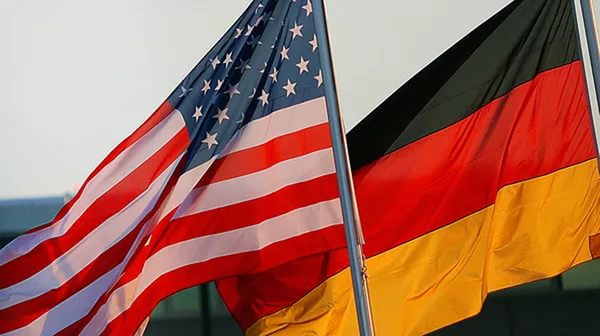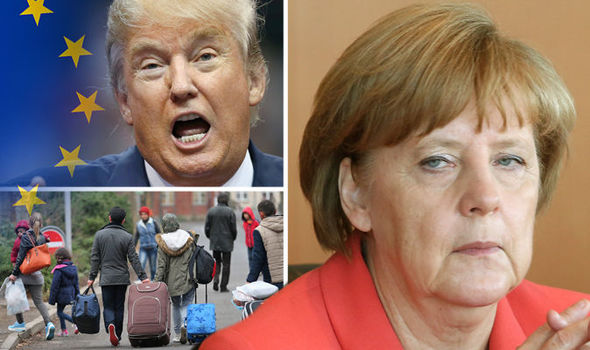The head of the Federal Government of Germany, Angela Merkel, is leaving for Washington, where the personal acquaintance of the leaders of Germany and the US is expected to take place. It is difficult to imagine figures more antagonistic than German Chancellor Merkel and US President Trump. Angela Merkel, born and socialized in the GDR, who later became the first woman chancellor in the history of the Federal Republic of Germany, is an ardent supporter of the idea of the European Union and the opponent of Brexit, while human rights and liberal values are an integral part of her political worldview and her foreign policy concept. The eccentric businessman Donald Trump is the exact opposite of the always balanced physicist Dr. Angela Merkel. Trump is enthusiastic about Brexit, stands for mass deportations of illegal migrants and is building a wall on the border with Mexico, while Merkel refused to close the borders in the most dramatic moments of the Syrian crisis, as a result of which the flood of refugees poured into Germany. Her decision, by the way, was severely criticized by Donald Trump.
Still, the two leaders, despite diametrically opposed views on many issues, will have to talk and negotiate with each other. After all, now the US and Germany are the two key countries of the transatlantic partnership. And the future of this partnership and joint priorities will be discussed at the first talks in the history of Merkel and Trump since the latter was elected president. Germany and the United States should once again identify common interests, priorities and set up the framework for possible mutual compromises.

There are a lot of discussion topics on the bilateral agenda: starting from the Ukrainian crisis to the conflict centers in the Middle East, North Africa and the future of the NATO mission in Afghanistan - Germany plays an important role for the North Atlantic alliance in this problematic country, since Germany is the second largest troop contributor there. According to high-ranking Merkel's officials, a united policy of the United States and Germany in resolving the Ukrainian crisis and in relation to Russia will be one of the top priorities. Chancellor's foreign policy adviser Christoph Heusgen told the briefing that he is confident that the FRG and the US will continue to work shoulder to shoulder on this topic, noting, however, that now they should wait for the approval of a number of key positions in the US State Department. Speaking on the possibility of expanding the so-called. 'Normandy format' due to the invitation of an American representative, Heusgen said that he does not think that it is the right time for it. Among the participants of the Normandy four there is no unity on this issue.
The economy will hold an important place in the upcoming high-level talks between Berlin and Washington. First of all, Germany is concerned about the threats of the new White House administration to increase import taxes, which can seriously affect the interests of export-oriented German business and force the Germa government to retaliate. The fact that that Merkel in Washington will be accompanied by the heads of Siemens, Shaeffler and BMW proves that the economy will play a central role in the upcoming meeting. The German chancellor will try to convince the US president of the benefits of bilateral trade without creating additional barriers for them: to date, German business provides employment for 810,000 Americans, and the amount of direct German investment in the US is 271 billion euros.

The plan to increase Germany's defense budget to 2% of the country's GDP level will also be discussed at a meeting between Merkel and Trump. Fundamentally Germany agrees with this requirement and assumed this commitment as early as 2014, but here, as they say, the devil is in the detail. There are very different interpretations of what concerns defense spending, and what does not. There are serious suspicions from the US side that the Germans will add to "defense spending" expenditure items, unrelated directly with the strengthening of the country's defense capacity - up to the cost of integrating refugees. As Christoph Heusgen told a briefing, the United States and Germany have a common understanding that the central priority is to fill certain gaps in the defense capacity of each of NATO countries, and the goal of bringing the defense budget to the level of 2% of GDP is rather symbolic. The 8% increase in Germany's military spending in 2017 and 2018, according to Heusgen, demonstrates the will and readiness of the country to strengthen its defense capability.
Thus, Merkel's visit to Washington will be of a fact-finding nature and become the foundation for an intensive continuation of German-American contacts at the highest level. Thus, Chancellor Merkel will meet with the US president at the upcoming NATO summit, at the G-7 summit and, finally, at the G-20 summit in Hamburg. However, according to the results of the joint press conference of Merkel and Trump, most likely that it will be possible to draw the first conclusions as to whether there has been a fiduciary contact between them and how ready the two key Western countries to continue working as a team.






